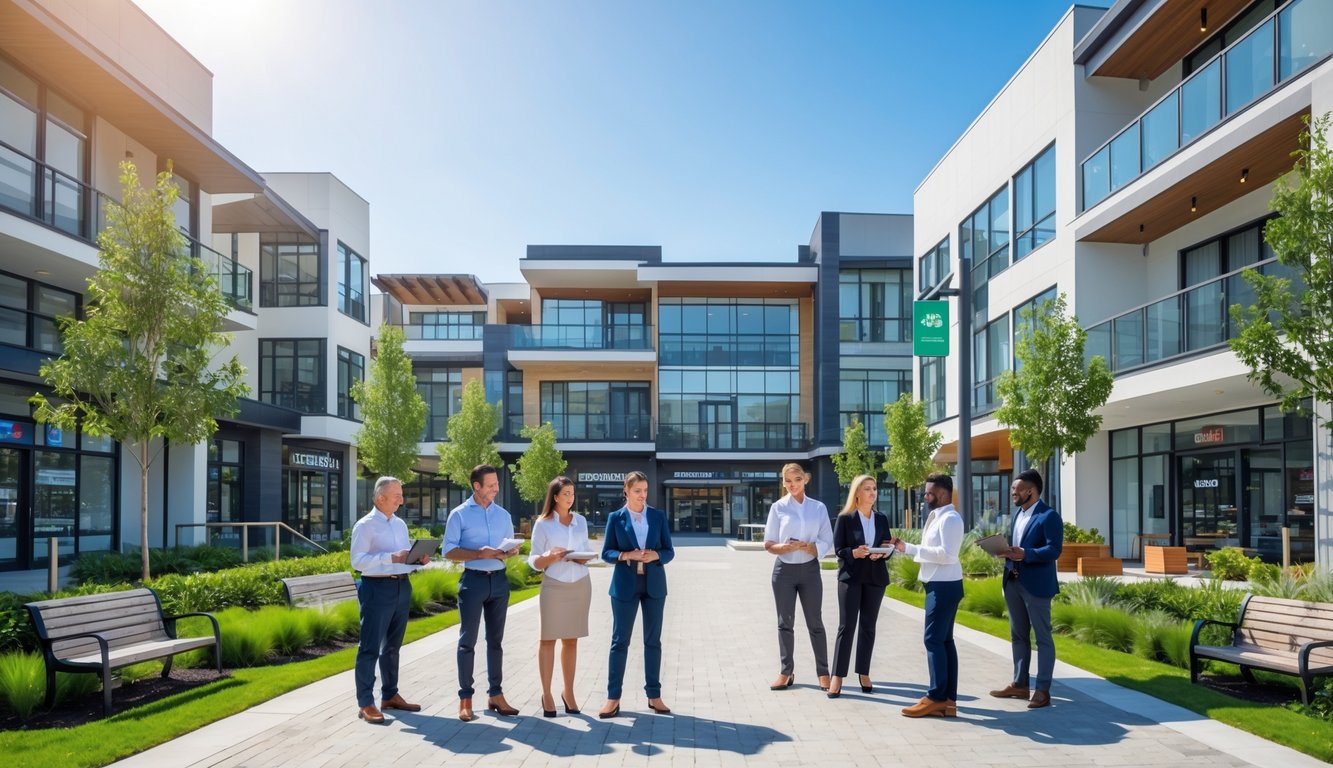Managing mixed-use properties requires balancing the needs of residents, businesses, and visitors within a single development. As urban populations increase and preferences shift toward integrated communities, these properties continue to gain traction for their convenience and potential for strong returns.
This article will guide you through the essentials of handling mixed-use developments, addressing the complexities involved and outlining best practices for success. You’ll gain practical insights to help you adapt to the unique demands of this growing sector.
Key Takeaways
- Mixed-use properties combine different functions within one space
- Effective management strategies boost property success
- Navigating challenges requires adaptability and foresight
Understanding Mixed-Use Property Concepts
Varieties of Integrated Use Properties
Mixed-use properties come in several formats, each designed for different urban planning needs and land availability. The three primary models include:
- Stacked Multi-Use Structures: In these developments, you’ll typically see commercial spaces like retail shops and offices on the ground and lower levels, with residential units above. This layout is popular in crowded city centers, maximizing both vertical space and street-level engagement.
- Side-by-Side Multi-Use Complexes: Instead of being layered, different property types—such as residential and commercial buildings—are arranged next to one another within a single neighborhood or development. This style gives you more room to plan a variety of amenities and allows both living and business activities to flourish within easy reach.
- Pedestrian-Focused Mixed Neighborhoods: Blending elements of both previous types, these projects prioritize walkability, biking, and public spaces. Features like wide sidewalks, green areas, and easy access to multiple amenities make them ideal for those seeking a car-free lifestyle.
A comparison table illustrates the layout and key characteristics:
| Type | Arrangement | Typical Features |
|---|---|---|
| Stacked (Vertical) | Uses layered in one building | Retail/office below, homes above |
| Side-by-side (Horizontal) | Buildings arranged together | Separate retail, office, residences |
| Pedestrian-focused (Urban) | Walkable, blended formats | Green spaces, mixed layouts |
Advantages of Mixed-Use Neighborhoods
Your experience with mixed-use properties brings benefits not only to landlords and tenants but also to the wider community. By uniting areas for living, working, shopping, and recreation, these developments support thriving urban environments and provide various conveniences.
- Greater daily convenience
- More robust local economies
- Stronger sense of community
The combination of residential, commercial, retail, and recreational zones in one area attracts residents and businesses alike. These projects often host shops, restaurants, and green spaces, making neighborhoods vibrant and self-sustaining. For more details on the purpose and planning of these projects, see this guide on mixed-use developments.
Financial Incentives and Market Strength
Integrated-use properties can provide multiple streams of revenue, helping you avoid the risks of relying solely on residential or retail tenants. The presence of commercial spaces tends to enhance the value and attractiveness of residential units, offering an added incentive for potential renters.
If you’re a business owner, mixed-use complexes often mean higher foot traffic and easy access to a local customer base, driving sales and supporting long-term growth. Property investors and landlords can benefit from strong property values and reduced vacancy rates. Additional insights on these financial opportunities appear in this article on mixed-use rental properties.
Sustainability and Resource Efficiency
Mixed-use developments stand out for their positive impact on the environment and urban sustainability. With homes, shops, and offices closely grouped, you help reduce the need for long commutes and limit urban sprawl. Centralizing activities in a single neighborhood allows communities to conserve land and protect natural resources.
Walkable designs naturally promote public transit, biking, and walking. This shift away from car dependency can lower emissions, enhance air quality, and foster a healthier urban environment. Including green spaces and eco-friendly infrastructure demonstrates a strong commitment to urban sustainability.
Community and Lifestyle Improvements
You’ll notice that these dynamic environments encourage interaction among residents, shop owners, and visitors, resulting in stronger community ties. Shared public spaces foster communication and social activity, which can enhance neighborhood safety and quality of life.
A typical mixed-use area supports a range of housing options, opening up opportunities to people with varied backgrounds and needs. This diversity contributes to a more inclusive local environment. The planning and design of mixed-use properties prioritize both practical amenities and the social well-being of residents, making these developments central to modern urban living.
Key Considerations for Managing Mixed-Use Properties

Navigating Legal and Zoning Rules
You should begin by understanding the local legal framework and zoning rules that apply to your property. These regulations can dictate allowed uses for different parts of your building, set limitations on height or density, and outline requirements around parking and shared utilities. Maintain regular communication with local officials and update your knowledge as laws evolve to avoid potential fines, delays, or legal disputes. Consistent due diligence in this area forms the foundation for compliant property management and helps protect your investment. For more on these challenges, see this guide on managing legal and zoning issues in mixed-use properties.
Selecting and Screening Tenants
A thoughtful tenant selection process is essential to a harmonious mixed-use environment. Both commercial and residential occupants should be screened for financial stability and compatibility with your property’s unique community. For commercial tenants, evaluate the type of business, operating hours, and potential to complement other tenants. For residential tenants, seek those who are community-minded and likely to respect the shared environment. Using a standardized screening checklist can help reduce risk and create a stable tenant mix.
Checklist for tenant screening:
- Assess credit history and references
- Verify income stability
- Review previous leasing history
- Evaluate compatibility with the property’s mix
Crafting and Negotiating Lease Terms
Lease agreements for mixed-use properties need to address the distinct needs of retail, office, and residential occupants. Spell out responsibilities for shared spaces, maintenance obligations, utility payments, and any specific rules applying to each type of tenant. Work with legal professionals familiar with mixed-use properties to ensure contracts are comprehensive and protect your interests. Be ready to negotiate terms to suit the varied requirements of your tenants, aiming for clarity and mutual benefit. Resources like the MXD201 guide provide more detail on managing these complexities.
| Lease Element | Residential Tenant | Commercial Tenant |
|---|---|---|
| Utilities | Included or metered | Metered or shared |
| Maintenance obligations | Shared, landlord-led | May share or self-manage |
| Use of Space | Living only | Sales, office, public access |
| Hours of Operation | N/A | Typically specified |
Coordinating Upkeep and Repairs
A proactive maintenance routine helps extend the life of your asset and keeps occupants satisfied. Residential and commercial areas require ongoing attention, as do all shared facilities such as lobbies, elevators, and outdoor spaces. Regular inspections help you anticipate and address wear and tear before they escalate into major issues. Establish simple reporting channels for tenants to ensure you can quickly respond to concerns, and work with a reliable property management company to streamline your operations. For further reading, check out tips on balancing maintenance needs for mixed-use properties.
Maintenance priorities:
- Safety and code compliance
- Cleanliness of shared areas
- Seasonal landscaping
- Timely repair of mechanical and structural elements
Overseeing Budgets and Finances
Sound financial strategies are vital when managing operations that include residential, commercial, and retail components. Your budget should capture all income sources and allocate funds for property operating costs, reserves, and capital improvements. Monitor actual expenditures against budgeted forecasts so you can adjust and maintain profitability. Property management software and professional advisors help you organize records, streamline collections, and improve financial planning. Strategic financial oversight sustains and grows the value of your investment. Learn more about effective financial management for mixed-use properties to strengthen your approach.
Key categories for financial review:
- Rent and lease income
- Maintenance and operational costs
- Insurance and tax payments
- Reserve funds for capital projects
- Marketing and tenant retention activities
Key Methods for Managing Mixed-Use Properties
Open Lines of Tenant Interaction and Teamwork
Strong communication forms the foundation of successful mixed-use property management. By keeping tenants informed through clear channels like newsletters, digital notices, or dedicated online portals, you promote transparency and address concerns promptly. Encourage feedback and open dialogue so tenants feel heard and included, which builds trust and strengthens your management plan.
Organize regular gatherings, such as workshops, networking events, or community service projects, to foster a close-knit atmosphere and make collaboration between residents and commercial tenants easier. Shared amenities—such as communal gardens, coworking spaces, or well-designed lobbies—further promote daily engagement, enhance tenant satisfaction, and contribute to a welcoming property culture.
A table outlining communication tools and their benefits:
| Communication Tool | Benefit |
|---|---|
| Tenant Portals | Real-time service requests, updates |
| Email Newsletters | Share news, events, and policies |
| Community Events | Increase foot traffic and interaction |
Tenant Engagement and Property Visibility
Understanding your primary renters and businesses is crucial to improve tenant retention and draw interest from prospective occupants. Research local demographics and complimentary businesses to inform your marketing approach, such as targeting younger professionals, families, or specific retailers that will benefit the current tenant mix. Tailor your marketing to highlight desirable attributes like mixed-use convenience, diverse amenities, or proximity to transit, making your property stand out.
Maintain a strong online presence. Develop a professional website that lists available units and amenities, making it easy for prospective tenants to visualize themselves in your space. Use social media to announce property updates, highlight community events, and target ads toward suitable audiences. Ensure your listings appear on leading rental and local business directories to maximize reach. These techniques help drive both digital and in-person foot traffic, key for both residential and commercial tenants.
Eco-Conscious Operations and Green Practices
Sustainability plays a major role in modern property management. Adopt energy-efficient solutions—like LED lighting, high-efficiency HVAC systems, and ENERGY STAR appliances—to lower operating costs and appeal to environmentally aware residents and businesses. Regularly evaluate space utilization to optimize lighting and heating needs.
Encourage tenants to participate in responsible waste disposal by providing properly labeled bins for recycling and composting, and share simple guidelines to ensure consistent compliance. Collaborate with local waste agencies to streamline recycling and composting, enhancing operational efficiency.
If you’re looking for distinctive ways to boost the property’s value, incorporate advanced sustainability measures such as solar panels, green roofs, or rainwater collection. These initiatives reduce the property’s environmental footprint and serve as valuable marketing points when attracting new occupants interested in eco-friendly, modern living spaces. For more on balancing sustainability and tenant satisfaction in mixed-use sites, visit insights on managing mixed-use properties.
By combining these strategies, you create spaces that support both business and residential needs, maintain high standards of operational efficiency, and support the well-being of everyone on your property.
Obstacles in Managing Mixed-Use Properties (and Ways to Address Them)
Meeting the Priorities of Business and Residential Occupants
Juggling the distinct needs of both commercial and residential tenants is a continuous task. Create clear, written policies on topics like operations hours, acceptable noise levels, and shared facility usage to reduce friction. Communicate openly—schedule regular check-ins and seek input from both communities to understand emerging issues and expectations.
Distribute short surveys or host periodic forums to allow tenants to voice opinions. Address concerns promptly and fairly to foster trust and play an active role in community building.
Handling Regulatory and Legal Complexities
Mixed-use buildings often face overlapping codes, zoning rules, and legal requirements. Stay up to date with local laws and ensure you meet all building codes to avoid penalties and delays. You may benefit from working with a property management expert or legal counsel who specializes in these property types.
Maintain a compliance checklist and keep records of permits or inspections for easy reference. Monitor law changes carefully to safeguard all parties, as these can impact both residential and business operations.
Strategies for Dealing with Disputes and Issues
Disagreements among tenants or with management can disrupt community engagement. Develop a transparent procedure for handling problems, and offer mediation or involve a neutral third party when necessary. Use a simple conflict resolution framework to resolve concerns promptly and support positive tenant relations.
Encourage tenants to voice small issues before they grow—taking prompt action demonstrates that you value their satisfaction and helps maintain a cooperative atmosphere.
Overseeing Shared Facilities and Community Spaces
Shared amenities, from parking areas to recreational zones, often require careful coordination. Establish detailed usage policies and display them in common areas. Use a clear schedule for cleaning and maintenance to enhance tenant experience and keep facilities in good condition.
Invite tenants to participate in community events or committees focused on shared amenities, encouraging a sense of ownership. Collect feedback and adjust guidelines when needed to ensure the spaces support the needs of the entire community. Tables or online booking systems also help streamline access and prevent overlapping use. For more practical insights on the management of these unique properties, visit this guide to mixed-use property management and see recommendations on handling mixed housing portfolios.
How Modern Tech Shapes Mixed-Use Property Oversight

Integrated Platform Solutions for Management
Simplify daily property management tasks by implementing modern property management software. These platforms provide automated workflows for collecting rent, managing lease renewals, and handling maintenance requests. Some software offers dedicated modules for both residential and commercial tenants, so you can efficiently manage a diverse tenant mix.
A detailed dashboard lets you oversee critical areas such as shared amenities and service coordination. These tools also help you track maintenance schedules and coordinate service requests, leading to faster response times and higher tenant satisfaction. Digital records and alerts reduce errors and keep communication streamlined between managers and tenants.
Intelligent Building Systems for Efficiency and Comfort
Smart building systems rapidly change how you manage mixed-use spaces. Automated HVAC and lighting systems optimize energy use, resulting in lower utility costs and reduced environmental impact. For example, sensors adjust lighting and temperature based on occupancy or specific hours, supporting both energy efficiency and tenant comfort.
Enhance security with advanced access control solutions. Tenants can grant entry remotely to visitors or vendors, and you can monitor access in real time. Integrate automated waste management systems to improve operational efficiency and maintain cleaner common areas.
Digital Promotion and Analytics for Tenant Engagement
Targeting potential tenants and retaining current ones becomes easier with digital marketing tools. Create an appealing web presence with professional design, search engine optimization, and regular blog updates. Social media management platforms simplify communications and strengthen your property’s brand.
With email campaigns and analytics, you track responses and adjust strategies to maximize engagement. Data from digital campaigns reveals preferences and behaviors, letting you fine-tune your messaging. Using these digital tools positions your property more competitively in the market, attracting a diverse and engaged tenant base.
Embracing the Future of Mixed-Use Property Management

Mixed-use property management requires a flexible approach that recognizes the variety of asset classes involved, such as residential units, offices, retail spaces, and recreational areas. Each type of space brings its own specific needs and expectations from both tenants and owners. Your success depends on your ability to communicate clearly with stakeholders, promote community engagement, and maintain efficient operations across all sectors.
A key element of future-focused management is adopting advanced technology. Use property management systems and smart building applications to streamline tasks, track maintenance, and enhance the tenant experience. Digital marketing strategies also help attract new tenants and retain current ones, making your property more appealing in a competitive market.
Challenges and Opportunities:
- Balancing the requirements of different tenant groups
- Navigating complex regulations across asset classes
- Managing communal spaces and conflict resolution
- Implementing sustainability initiatives
Below is a comparison of essential actions:
| Strategy | Benefit |
|---|---|
| Collaboration | Strong community ties |
| Tech integration | Efficient operations |
| Sustainable practices | Long-term asset value |
Staying responsive to evolving industry trends positions you to maximize the value and appeal of your mixed-use developments.
Frequently Asked Questions

Main Advantages of Managing Mixed-Use Properties
Managing mixed-use properties offers several benefits:
- Diverse income streams: With both residential and commercial tenants, you can spread risk across different types of leases.
- Enhanced community appeal: These spaces often foster vibrant neighborhoods, attracting more tenants.
- Opportunity for increased property value: A well-managed mix can boost both occupancy and profitability.
For more, visit this guide on mixed-use property management.
How Local Zoning Laws Affect Mixed-Use Management
Zoning regulations set the framework for what activities can take place on the property. You must ensure that residential, retail, or office uses comply with municipal zoning requirements. Following these rules ensures legal operation and smooth management of all spaces.
Methods for Boosting Tenant Loyalty in Mixed-Use Projects
To keep tenants long-term:
- Regular communication and prompt service build trust.
- Creating shared amenities (such as gyms or lounges) increases satisfaction for both residents and businesses.
- Hosting community events can help foster engagement and retention.
Specific Challenges in Overseeing Both Residential and Commercial Spaces
Balancing the needs of different tenant types is complex. Residents may require quiet spaces and residential amenities, while businesses often need flexible hours and delivery access. You must coordinate maintenance, meet various regulatory standards, and manage diverse lease agreements in these dynamic environments. Details on managing mixed-use spaces appear in this overview of challenges and strategies.
Ways Technology Can Improve Mixed-Use Property Oversight
Technology streamlines many aspects of property management:
| Technology Tool | Application Area | Benefit |
|---|---|---|
| Property management platforms | Operations and communication | Centralizes data and speeds up responses |
| Automated billing | Rent collection | Reduces errors and saves time |
| Online maintenance requests | Repairs and upkeep | Increases efficiency and tracking |
These systems help you coordinate needs across all tenant types seamlessly.
Financial Best Practices for Overseeing Mixed-Use Developments
Consider these practices:
- Regular budget reviews keep expenses under control.
- Transparent financial reporting builds trust with stakeholders.
- Reserve funds for major repairs maintain property value and reduce financial surprises.
Effective financial planning sustains both the residential and commercial sides of your mixed-use property.
Want to skip the costly learning curve in property management?
Stop making costly property management mistakes! Access comprehensive real estate investing guides written by a CCIM-certified expert with three decades of experience.

Master the art of real estate investing with The Real Estate Property Management Guide: Premium Edition – your comprehensive roadmap to successful property management.
Whether you’re a novice investor or seasoned professional, this guide covers everything from selecting the right investment properties to tenant management and property marketing.
The author, Jeff Rohde writing as Jeffrey Roark, is a professional with over 25 years of real estate experience. This Premium Edition includes the valuable bonus book Investment Real Estate Analysis: A Case Study to help you identify hidden opportunities and evaluate properties like a professional.
Learn practical, actionable strategies for both residential and commercial properties, from single-family homes to office buildings and shopping centers.
Don’t just buy property – learn how to manage it successfully and maximize your investment potential.
Grab your copy now from your favorite bookseller:
- Amazon (Basic Edition, does not include Investment Real Estate Analysis: A Case Study)
- Books2Read for Apple, Barnes & Noble, Kobo, Scribed, and 8 more sellers with both eBook and paperback options available (Premium Edition, includes Investment Real Estate Analysis: A Case Study)
- Payhip as a downloadable PDF (Premium Edition)
Ready to take your business to the next level?
- Subscribe to our newsletter
- Visit the learning center
- Learn more about our consulting services



